150th Anniversary Mass at St. Andrew’s Catholic Church,
Ngbighoko, Benin City
on 17 March 2012
 On the occasion of the Mass to celebrate 150 years of missionary endeavour in part of Nigeria, Most Rev Anthony Okonkwo Gbuji, Bishop Emeritus of Enugu, was invited to preach.
On the occasion of the Mass to celebrate 150 years of missionary endeavour in part of Nigeria, Most Rev Anthony Okonkwo Gbuji, Bishop Emeritus of Enugu, was invited to preach.
In 1964, the request of Bishop Patrick J Kelly of Benin City to the Holy See to divide his diocese saw the erection of the diocese of Warri. Its first bishop was the Rt Rev Lucas Nwaezeapu (RIP). Nine years later, on 15 July 1973, a second diocese was carved out from Benin City. The mantle of leadership of the fledgling diocese of Issele-Uku was laid on a young priest, Rev Fr Anthony Okonkwo Gbuji. He led the diocese until 8 November 1996 when he was translated to Enugu as bishop, in succession to the Rt Rev Michael Eneje who had retired. Bishop Gbuji was to lead Enugu for over 12 years before his own resignation, having reached the age limit.
It was fitting that Bishop Gbuji be asked to preach at the Mass to mark the 150th Anniversary of the arrival of the SMA missionaries in this part of the Lord’s Vineyard. His homily is a treasure throve of information and traces the development of the Church from its beginnings until the present day. Bishop Gbuji worked with many of the pioneer missionaries and knew them well. He also has an unrivalled knowledge of the development of the Catholic Church in this part of Nigeria. His homily should be read by all who have an interest in the history of the Church, and in particular of the SMA, in this part of Nigeria. Bishop Gbuji preached the following homily to the assembled faithful.
Your Excellencies, Beloved SMA Jubilarians, Missionary Sisters of Our Lady of the Apostles (OLA), my dear and Holy People of God
This morning we heard once again those powerful and captivating words of invitation and mandate from the loving heart of Christ the Redeemer: “FOLLOW ME AND I WILL MAKE YOU INTO FISHERS OF MEN” (Lk. 5:10; Mt. 4: 19). The mission of being fishers of people is addressed not only to Peter, but also to all those who are with Jesus, that is, to all his true followers. 150 years ago the hearts of some generous and gallant disciples were set on fire to carry the message of Good News of salvation to countries and peoples far away from theirs. That fire has blazed the path of salvation throughout many lands in Europe, Africa, Asia, Oceania and the United States of America: Yes! “Their report goes forth through all the earth, their message, to the ends of the world.” (Ps. 19:5).
My dear people of God, the story of the Society of African Missions (SMA), is a wonderful success story in the salvation history of the Church. The lives of all of us gathered here today have been deeply touched positively through the proclamation of the good news by the SMA missionaries in different parts of our country Nigeria. For this may the Lord be praised both now and forever.
Today indeed is a day of joy; it is a day of prayerful reflection and a day to express our gratitude to God for the abundant blessings on us; and to our dear SMA Fathers and Brothers for their missionary work and in our country, Nigeria. Our heartfelt gratitude similarly goes to the Missionary Sisters of Our Lady of the Apostles (OLA), the twin sisters of the SMA’s, for their effective collaborative ministry in our land.
A DAY OF JOY
Today, the entire Church, particularly the Church in Ireland and in Nigeria, celebrates the feast of St. Patrick who planted the seed of faith and mission in Ireland in 432 AD, about 1580 years ago. And all of us here like several millions of others, are overjoyed and blessed to join our S.M.A friends to offer today a Mass of Thanksgiving to mark the 150th anniversary of their missionary work in Nigeria. Our joy is overflowing because we are invited also to remember the memory of 425 deceased religious personnel who worked in the Mid West of Nigeria from 1884 – 2011. We are offered the opportunity to pray for their eternal happiness and repose in heaven: Eternal rest grant unto them O Lord….
A DAY OF PRAYERFUL REFLECTION
This day of joy is also a day of prayerful reflection, if only briefly to narrate within 20 or more minutes the long, painful and sacrificial, yet glorious and successful missionary adventures for the 150 years of the S.M.A in Nigeria. I do this under three main headings:
(i) The beginning of the Society of African Missions (1856 – 1863)
(ii) The S.M.A in Nigeria (1963 – 1985)
(iii) The New S.M.A ERA (1986 – 2012)
THE BEGINNINGS OF THE SOCIETY OF AFRICAN MISSIONS (1856 – 1863)
The early missionary endeavours of the Portuguese and the Spanish in the 15th Century (1472 – 1651) to Nigeria, from all human calculation were a total failure.
In February 1856, Cardinal Alessandro Barnabo, the Secretary of the Sacred Congregation of Propaganda Fide asked Bishop de Marion Brésillac to found a missionary congregation to assist him in his new work in West Africa and to ensure stability and continuity.
On 8 December 1856, on the hill of Fourviere – at the shrine dedicated to Our Lady in Lyons, France, Bishop de Brésillac and six companions established the Society of African Missions. The special aim of the new Society was the evangelization of the most abandoned people in Africa and the formation of an indigenous clergy to care for the newly-established communities – thus enabling the missionaries to move on to evangelize others who were still in need.
MISSIONARY ASSIGNMENT IN AFRICA
In 1858 Rome entrusted the mission of Sierra Leone to the SMA and in the same year, the first three missionaries departed for their new mission.
In 1859 Msgr. de Brésillac entrusted the SMA in Europe to Fr. Augustine Planque and set out with two others to join his three confreres in Sierra Leone.
DEATHS IN FREETOWN
On arriving off Freetown they were advised not to go on shore as an epidemic of Yellow Fever was raging in the town, but wanting to be with his missionaries and flock, the bishop and the others disembarked. Twenty-six days later, all the missionaries were dead with the exception of one Brother who returned to France to deliver the sad news. But the saying of the Lord must always come true that: “unless a wheat grain falls on the ground and dies, it remains only a single grain…” (Jn.12:24).
Despite such a harrowing loss, the work was destined to continue, and, with the blessing of Pope Pius IX and under the direction of Fr Planque, a new beginning was made. Another group left for Africa in 1861 and a foundation was made in Dahomey (now Benin Republic).
Numerous deaths of young priests marked these early years of the Society, yet still it spread quickly throughout the West Coast of Africa. “The first missionaries sent to the people of Africa will not be able to achieve their ends, but thanks to their sacrifice, they will sow an abundant harvest, which their successors will reap”, (wrote one of those early missionaries). By the time of Fr Planque’s death in 1907, there were 296 bishops, priests and brothers, 205 of whom were on the missions in 8 African countries: Dahomey (Benin), Nigeria, Algeria, South Africa, Egypt, Gold Coast (now Ghana), Ivory Coast and Liberia. At this stage more than 130 others had given their lives within a few short years of reaching African soil, then known as the “White man’s grave”.
EXPANSION OF SMA (UP TO 1992)
From the beginning, the SMA drew its membership from several countries from which, after the death of Fr Planque, the following Provinces were gradually formed in Ireland (1912), Holland (1923), two in France: Lyons and Est (1927), USA (1941), Great Britain (1968), Italy (1982), and the Districts of Canada (1968) and Spain 1992).
Between 1918 and 1992 the Society had also spread to Morocco, Togo, Niger, Democratic Republic of Congo, Zambia, Central African Republic, Tanzania, South Africa, Kenya and Angola. It also opened houses in Australia and Argentina.
SOCIETY OF THE AFRICAN MISSIONS IN NIGERIA (1863 – 1985 – 2012)
The SMA presence in Nigeria goes back to 8th September, 1863 when Fr. Francesco Xavier Borghero SMA arrived in Lagos. (Fr Borghero had paid a brief visit to Lagos in March 1862, on his way to Sierra Leone).
The elderly SMA Fathers in our midst enjoy to tell the story of how the pioneer priest to Nigeria was subjected to some catechism test before he was accepted as a Catholic priest: “There was a small Catholic Community of Brazilians under the care of a catechist named “Padre” Antonio. He questioned Fr. Borghero, the bearded figure in the white cassock, to know if he were a Catholic priest. One of the questions he asked was to could recite the Rosary. Satisfied with the replies, Fr. Francesco Borghero was accepted. On this occasion fifty nine infants were presented to him for the sacrament of Baptism. One can then understand why till today the SMA Fathers would subject the Nigerian Candidates for the Sacraments of Baptism, Holy Communion and Confirmation to rigorous catechism questions before administering the sacraments to them. Is it a revenge Bishop P.J. Kelly SMA and his SMA Brothers (Confreres) were taking on our people or what?
At first the progress of evangelization was slow but gradually the seeds sown began to bear fruit with many of our people blessed with strong faith in Christ; happily, many of us are priests and bishops today. May God bless and reward the SMA most abundantly. We pray O Lord!
As other SMA Fathers followed the footsteps of Fr. Borghero, eg Fr. Courdioux in 1863; Fr. Noche in 1864; Fr. Jolans in 1866; Frs. Vermorel, Barth and Francois Cloud in 1969, mission centres were established in different parts of the country (by the SMA):
(1880 – 1890) Abeokuta, Lokoja and Asaba
(1890 – 1900) Ibadan
(1900 – 1910) Shendam – First in Northern Nigeria.
(1910 – 1920) Ondo, Ekiti; Ilorin and Ijebu – Ode
(1920 – 1930) Kano, Kaduna and Jos.
A spectacular breakthrough in the establishment of the Church in Nigeria by the SMA was the priestly ordination of Rev. Father Paul Obdooechine Emecete, in 1920. It was the first native priest in the entire West Coast of Africa. Thousands of other priests have since followed the footsteps of our pioneer priests. Many of us here today are overjoyed and proud to be counted among them. We are infinitely indebted and very grateful to the SMA Fathers.
Another break through that accounted for the huge success of evangelization by the SMA was the establishment of education institutions at all levels. Among their numerous and most outstanding schools and worthy of special mention are: St. Gregory’s Lagos; Loyola College, Ibadan; ICC Benin-City; St. Patrick’s Asaba; St. John’s Kaduna; CMI, Kafanchan and St. Joseph’s Vom; as well as St. Theresa’s minor Seminary, Oke-Are, Ibadan, SS. Peter and Paul, Bodija Ibadan, all founded by SMA priests. During the period of Bishop P. J. Kelly, in Bendel State, more than 75% of all the Secondary Schools in the State were established by the SMA Fathers. This is a record unbeaten in the history of education in many part of Nigeria!
 THE SMA IN BENIN CITY PROVINCE
THE SMA IN BENIN CITY PROVINCE
Our reflection cannot be complete if we fail to put on record the tremendous growth of the Church in Benin-City Province where the SMA put in their best apostolic mission labour. All of us gathered here are witnesses to their immense sacrifice and successes in evangelization in the entire world mission history.
The best wine at today’s wedding feast of the SMA and their mission in Nigerian is about to be served and I pray, you will enjoy it to the last cup and dreg. The statistics clearly show as follows:
In 1884, the Mission territory of Benin City was carved out of the Vicariate of the Bight of Benin. It was given by Rome to the Society of African Missions (SMA) and the territory was known as the Prefecture Apostolic of the Upper Niger and the first Prefect-Apostolic was Fr. Jules Poirier, SMA.
In 1911, the Prefecture of Western Nigeria was established with Fr. Carlo Zappa, SMA, as the Prefect-Apostolic. In 1918 Bishop Thomas Broderick, SMA succeeded Fr. Carlo Zappa (died in 1917) as Vicar Apostolic when the territory was raised to the status of a Vicariate. In 1934 Bishop Leo Hale Taylor, SMA was appointed Vicar Apostolic of Western Nigeria, succeeding Bishop Thomas Broderick who had died in 1933. Bishop Taylor was succeeded as Vicar Apostolic of Western Nigeria by our own Bishop P. J. Kelly, SMA.
In 1943, the territory became known as the Vicariate of Asaba-Benin.
In 1950, the Vicariate of Asaba-Benin became the Diocese of Benin City. Its first Bishop was Bishop Patrick Joseph Kelly, SMA. Bishop Kelly was succeeded in 1973 by our beloved brother and son now Archbishop Bishop Patrick Ebosele Ekpu. The Diocese celebrated its Centenary in 1984 and in 1994 it was elevated to the status of an Archdiocese.
Archbishop Ekpu retired in November 2006 and Fr. James Mary Okunbor, V.G. was appointed Administrator of the Archdiocese. In 2007 Bishop Richard Anthony Burke, SPS (then Bishop of Warri) was appointed Archbishop of Benin City and he was installed in 2008. In 2010 Archbishop Burke resigned and on 31st May 2010, Bishop Anthony O. Gbuji (Bishop-Emeritus of Enugu) was appointed Apostolic Administrator of the Archdiocese of Benin City. On 28th April, 2011 Bishop Augustine Obiora Akubeze was installed as the Archbishop of the Metropolitan See of Benin.
In 1955, the Kabba Prefecture was erected out of Benin City Diocese and entrusted to the Canadian Province of the Spiritan Congregation (C.S.Sp.) and led by Msgr. Auguste Delisle. In 1965 the Diocese of Lokoja was created with Bishop Delisle C.S.Sp. as its first Bishop. Bishop Delisle was succeeded in 1971 by Bishop Alexius Obabu Makozi, who was succeeded in 1992 by Bishop Joseph Sunday Ajomo. The current Bishop is Bishop Martin D. A. Olorunmolu. Lokoja is now in the Abuja Ecclesiastical Province.
In 1964, the Diocese of Warri was created from the Diocese of Benin City and Bishop Lucas Olu Nwaezeapu was appointed its first Bishop. He was succeeded in 1991 by Bishop Edumund Fitzgibbon SPS. Bishop Richard Anthony Burke SPS succeeded him in 1997. Bishop Burke was installed as Archbishop of the Diocese of Benin City in 2008. Bishop John Oke Afareha was installed as the Bishop of Warri in 2010.
In 1973, the Diocese of Issele-Uku was created from the Diocese of Benin City and Bishop Anthony O. Gbuji became its first Bishop. Bishop Gbuji was succeeded in 1990 by Bishop Emmanuel E. Otteh who was succeeded in 2004 by the current Bishop, Bishop Michael O. Elue.
In 1991, the Apostolic Vicariate of Bomadi was carved out of the Dioceses of Warri and Port Harcourt and made a mission sui juris in 1992 with Msgr. Thomas Greenan SPS as the Ecclesiastical Superior. In 1997 Bishop Joseph O. Egerega was installed as first Bishop of Bomadi Vicariate. In 2008 Bishop Egerega was succeeded by Bishop Hyacinth O. Egbebo MSP (Missionaries of St Paul, a Nigerian missionary society).
In 2002, the Diocese of Auchi was created from the Archdiocese of Benin and in 2003 Bishop Gabriel Godwin Ghieakhomo Dunia was installed as its first Bishop.
In 2005, the Diocese of Uromi was formally created from the Archdiocese of Benin City. In 2006 the Diocese was canonically erected with Most Rev. Dr. Augustine Akubeze as its first bishop now the Archbishop of Benin City Province.
The record of the SMA in Benin City Province may be crowned with some brief mention of Bishop Patrick Joseph Kelly SMA (1940 – 1973). We all remember him with deepest respect and joy. May his soul and the souls of all the faithful departed… rest in peace. Amen.
Bishop Patrick Joseph Kelly SMA was appointed Bishop as successor to Bishop Taylor in 1940. His Episcopacy was a long one of thirty-three years, and a very fruitful one. There was progress on all fronts. Catechists were his top priority. He trained the catechists personally in his own compound. During the Confirmation visits he insisted on examining the candidates – thousands of them – himself. He was determined to build up the indigenous Church. In 1940 there were three indigenous priests; when he resigned in 1973 there were 50 and hundreds of Seminarians and Sisters. Likewise the number of Catholic Schools continued to multiply throughout the Diocese. (The Vicariate of Asaba-Benin became the Diocese of Benin City in 1950). He established the first Secondary Schools, Immaculate Conception College, Benin and St. Patrick’s, Asaba in the mid forties and he was the Proprietor of up to 75% of the secondary schools in 1972. But Bishop Kelly was above all a man of prayer.
He was an SMA to the core and it was fitting that he should spend the latter years of his life at our Provincial Mother House in Cork City, Ireland. He died there on 18th August 1991, two weeks short of his 97th birthday. The Cause for his Canonization is underway in the Benin City Archdiocese. We hope that after this celebration the cause will receive a new and fresh impetus.
THE NEW ERA IN THE SMA EVANGELIZATION (1986 – 2012)
In 1982 the Holy Father, Pope John Paul II came on a pastoral visit to Nigeria and proclaimed for the Church in the country a New Era of Evangelization. This must have sparked off a new zeal and courage in SMA mission thrust. Since 1983 new foundations have been made to ensure that the missionary work of the SMA to Africa and African peoples will continue.
In 1986, a new chapter began for the SMA in Nigeria. With the local Church well established and with the challenge of Pope John Paul II to the Church in Nigeria to embark on a New Era of Evangelization, the time seemed right to invite Nigerians under the banner of the SMA, to go outside their own country, to preach the Gospel to parts of Africa where the Church is not as yet well established. From SMA records made available to us, fourteen Nigerian priests have been ordained (as SMA Fathers) and are working in a number of countries outside Nigeria. Those evangelized have now become evangelizers! May the Lord be praised both now and forever.
 “WE SHALL REMEMBER THEM”
“WE SHALL REMEMBER THEM”
This is the title of the book containing the profiles of 425 deceased religious personnel who worked together with the SMA in the former Mid West region of Nigeria from 1884 – 2012. The Necrology of the SMA and the OLA record thousands of other missionaries who have paid, with the sacrifice of the lives, the great and precious price for love of God and neighbour.
Many of the SMA missionaries are buried in countries scattered all over the mission lands, particularly in Nigeria. A pilgrimage to the cemetery in Asaba would be spiritually rewarding; and as you gaze on and wonder, please, offer up prayers to God, to grant eternal rest to the souls that lie there and await the glorious day of the resurrection. May their souls rest in peace. Amen.
A DAY TO EXPRESS OUR GRATITUDE
As we celebrate with joy and recount the numerous achievements of the SMA over the past 150 years of the arrival of the first missionaries in modern times to establish the Church in Nigeria we are filled with an over powering feeling of gratitude to God. He has in his infinite love and mercy worked in our land and in our lives great miracles; he has poured out upon us abundant blessings of faith, hope and charity.
What shall we render to the Lord for the immeasurable gift of faith in Christ. This has proven to be the greatest gift God can give to his beloved children, for through faith in Christ we are destined to be coheirs with him of the eternal kingdom of our Father in heaven.
With the grace of God and through the special intercession of so many holy and saintly SMA missionaries who have departed this life before us, we shall work hard and zealously to reach heaven.
Dear SMA missionaries, living or dead: The Church in Nigeria today greets you and remembers you with immense gratitude. We ask the good Lord to bless and reward all the SMA missionaries to Nigeria and to the whole world. May God look kindly on the many thousands and millions of the SMA missionaries and all our people who have come to know, love and serve God and have since gone before us marked with the sign of faith. May God grant them also eternal rest in heaven. Amen.
May this Mass of Thanksgiving which we all offer today with so much love and gratitude to God, open up a new spring-time of evangelization and mission for the Society of the African Missions.
May the Blessed Virgin Mary the Mother of Jesus and Queen of the Apostles continue to protect and guide all SMA missionaries and the OLA Sisters, in the New Era of Evangelization. Amen.
+Anthony O. Gbuji
Bishop Emeritus of Issele-Uku and of Enugu
17 – 03 – 12

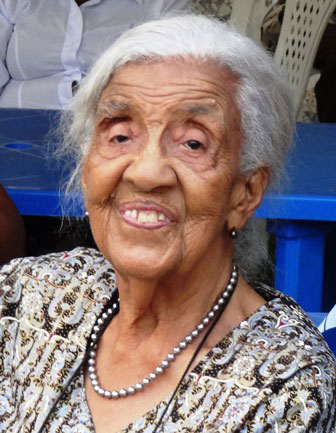
 In this Mass we celebrate her life. We thank God that He has blessed her with a long life. The Bible says our length of days in 70 or 80 for those who are strong but Auntie Katie has gone far beyond this and was in her 97th year when she died. God has also blessed her with 4 children of her own, two adopted children and many grandchildren, living as she did to see her children’s children.
In this Mass we celebrate her life. We thank God that He has blessed her with a long life. The Bible says our length of days in 70 or 80 for those who are strong but Auntie Katie has gone far beyond this and was in her 97th year when she died. God has also blessed her with 4 children of her own, two adopted children and many grandchildren, living as she did to see her children’s children.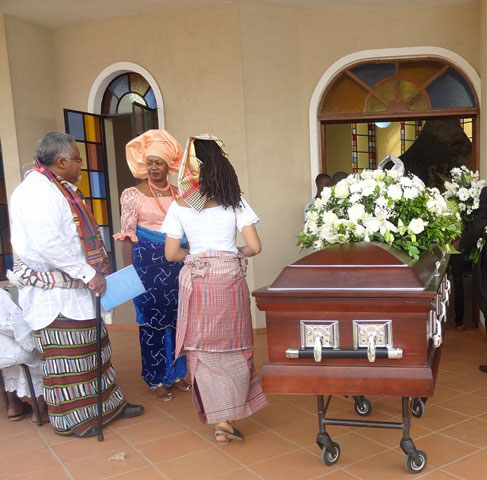



 A Life Transformed
A Life Transformed 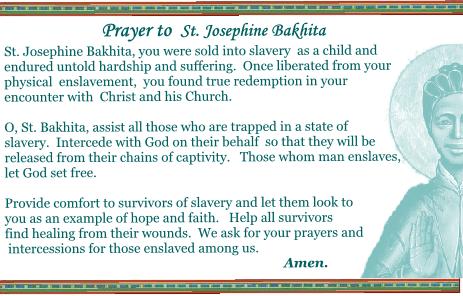
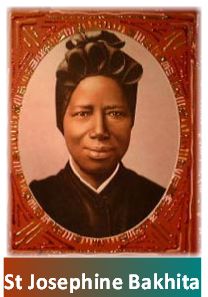
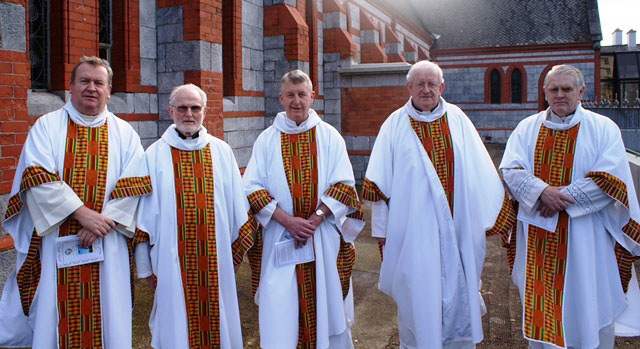


 tropics, so he spent a pleasant two and a half year spell as curate in Castlehaven parish in West Cork. Since 1987 he has been ministering at various tasks for the SMA community in Dromantine.
tropics, so he spent a pleasant two and a half year spell as curate in Castlehaven parish in West Cork. Since 1987 he has been ministering at various tasks for the SMA community in Dromantine. Martin, like all of us, will be saved through the mercy and compassion of God but his life response to the graces received was generous and sincere.
Martin, like all of us, will be saved through the mercy and compassion of God but his life response to the graces received was generous and sincere. 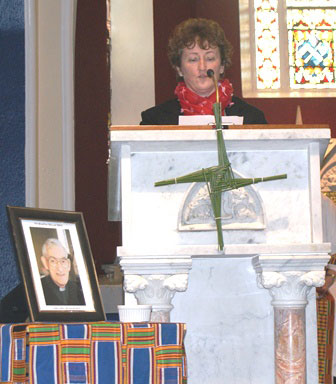
 A large gathering of family and friends from Co Wexford gathered with the Wilton SMA community to ‘pray Fr Martin home to God’ as the SMA Provincial Leader, Fr Fachtna O’Driscoll reminded us in his introduction to the Mass. The principal concelebrants were, from left: Fr Paddy O’Rourke (Co-Leader, SMA Dromantine), Fr Martin Costello (a classmate of Fr Martin), Fr O’Driscoll, Fr Tom Curran (SMA General Councillor in Rome) and Fr Robert Nolan (a cousin on Fr Martin and Parish Priest in Adamstown, Co Wexford).
A large gathering of family and friends from Co Wexford gathered with the Wilton SMA community to ‘pray Fr Martin home to God’ as the SMA Provincial Leader, Fr Fachtna O’Driscoll reminded us in his introduction to the Mass. The principal concelebrants were, from left: Fr Paddy O’Rourke (Co-Leader, SMA Dromantine), Fr Martin Costello (a classmate of Fr Martin), Fr O’Driscoll, Fr Tom Curran (SMA General Councillor in Rome) and Fr Robert Nolan (a cousin on Fr Martin and Parish Priest in Adamstown, Co Wexford).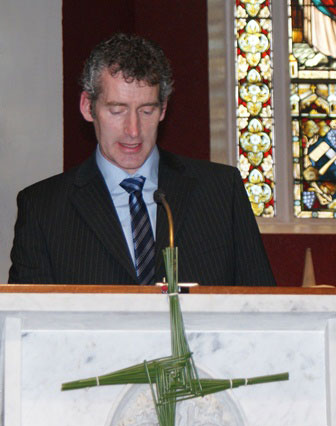
 Paul Fortune (pictured) read from the Book of Wisdom (3:1-6, 9) and Aileen Nolan read from St Paul’s Letter to the Romans (8:28-30). The Gospel, from the 17th Chapter of St John, was read by the Dromantine Co-Leader, Fr John Denvir.
Paul Fortune (pictured) read from the Book of Wisdom (3:1-6, 9) and Aileen Nolan read from St Paul’s Letter to the Romans (8:28-30). The Gospel, from the 17th Chapter of St John, was read by the Dromantine Co-Leader, Fr John Denvir. After his ordination, Martin was appointed to Northern Nigeria and soon found himself on the staff of St. Murumba’s College in Jos. Later on he taught in the minor seminary in the Diocese of Jos and also in the teacher training college at Kafanchan where he was much loved, respected and appreciated as an English teacher. Having spent another 12 years in the pastoral ministry in Jos, he worked in several parishes: Pankshin, Akwanga, Langtang and Shendam, names that regularly fell from his lips as he loved to recall various incidents of note that made a lasting impression in his life in Nigeria.
After his ordination, Martin was appointed to Northern Nigeria and soon found himself on the staff of St. Murumba’s College in Jos. Later on he taught in the minor seminary in the Diocese of Jos and also in the teacher training college at Kafanchan where he was much loved, respected and appreciated as an English teacher. Having spent another 12 years in the pastoral ministry in Jos, he worked in several parishes: Pankshin, Akwanga, Langtang and Shendam, names that regularly fell from his lips as he loved to recall various incidents of note that made a lasting impression in his life in Nigeria. Our picture shows Fathers Frank Meehan, Martin Nolan and Leo Silke celebrating Mass in an outstation of Langtang.
Our picture shows Fathers Frank Meehan, Martin Nolan and Leo Silke celebrating Mass in an outstation of Langtang.

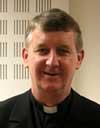
 I am very happy to be here this evening and to be part of this unique event. To the best of my knowledge this is the first time ever in Ireland that a resource which is the fruit of communication, cooperation and consultation between Muslims and Christians has been produced.
I am very happy to be here this evening and to be part of this unique event. To the best of my knowledge this is the first time ever in Ireland that a resource which is the fruit of communication, cooperation and consultation between Muslims and Christians has been produced. 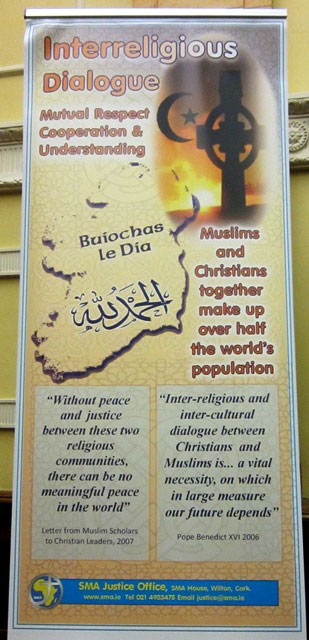
 cooperation on 16 January 2013. There was a capacity attendance at the launch, by the Deputy Lord Mayor of Cork, Councillor Emmet O’Halloran, in the City Council Chamber of the Cork City Hall.
cooperation on 16 January 2013. There was a capacity attendance at the launch, by the Deputy Lord Mayor of Cork, Councillor Emmet O’Halloran, in the City Council Chamber of the Cork City Hall. Sheikh Umar Al-Qadri of the Al-Mustafa Islamic Educational Cultural Centre in Ireland, who was very involved in the preparation of A Journey Together told us that there are now more than 50,000 Muslims living in Ireland. An Islamic scholar, the Sheikh, pictured with Fr Angelo Lafferty SMA [Director of the SMA Justice Office], has lived in Ireland for the last 10 years. Paying tribute to this production of Cois Tine, the Sheikh said that many government bodies and local organisations, some of which he has been part of, acknowledge the need for inter-faith dialogue and religious pluralism but none of them has produced a resource like A Journey Together. “This is unique and I cannot tell you how important it is for me as an Imam because many times Christians come to the Mosque to know more about Islam. They don’t come to convert; they just want to know more about what is Islam.”
Sheikh Umar Al-Qadri of the Al-Mustafa Islamic Educational Cultural Centre in Ireland, who was very involved in the preparation of A Journey Together told us that there are now more than 50,000 Muslims living in Ireland. An Islamic scholar, the Sheikh, pictured with Fr Angelo Lafferty SMA [Director of the SMA Justice Office], has lived in Ireland for the last 10 years. Paying tribute to this production of Cois Tine, the Sheikh said that many government bodies and local organisations, some of which he has been part of, acknowledge the need for inter-faith dialogue and religious pluralism but none of them has produced a resource like A Journey Together. “This is unique and I cannot tell you how important it is for me as an Imam because many times Christians come to the Mosque to know more about Islam. They don’t come to convert; they just want to know more about what is Islam.”

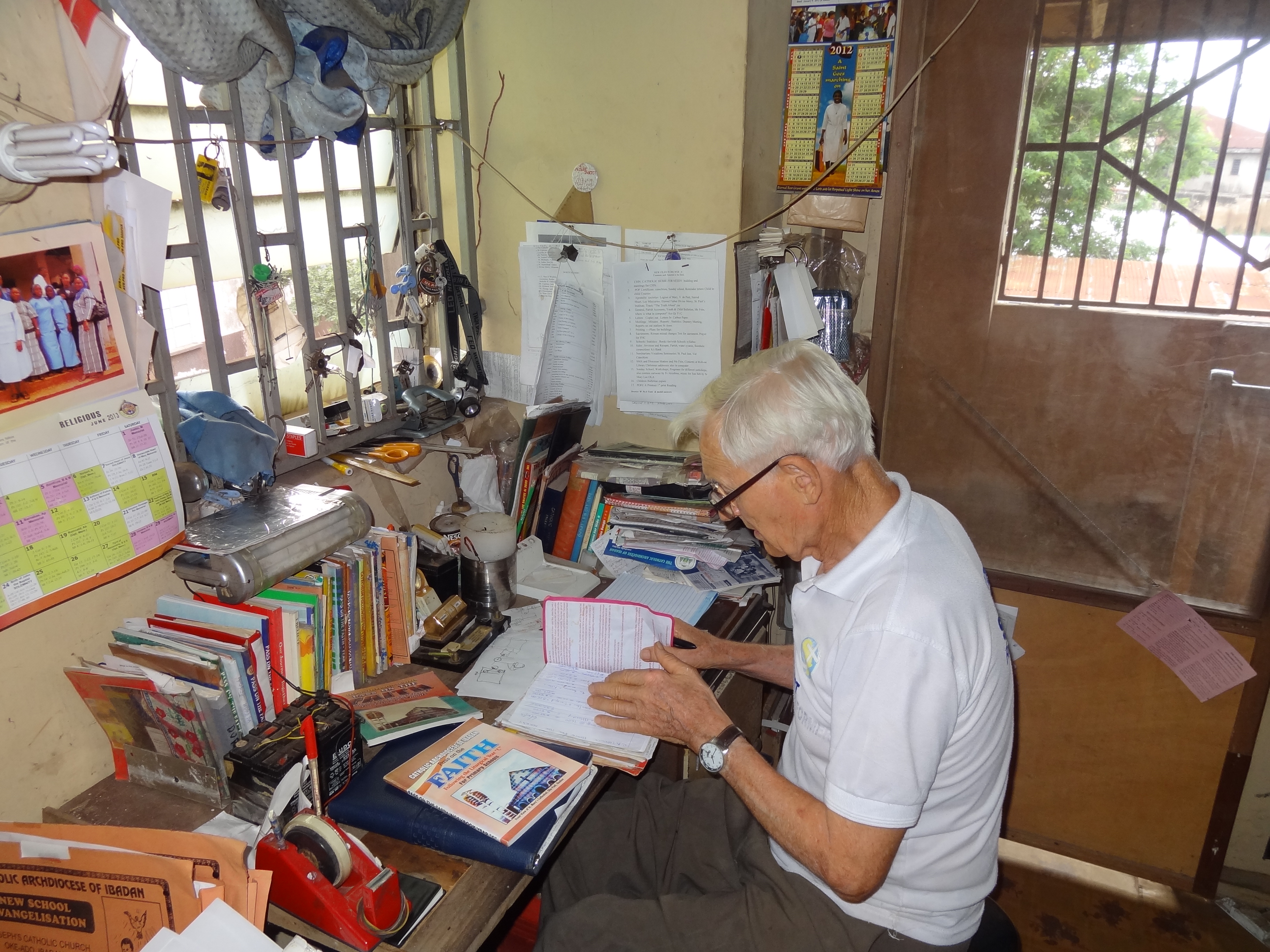


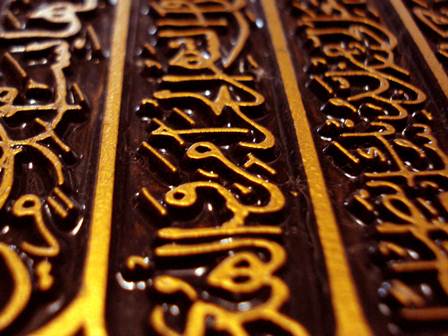 SCARBORO MISSIONS: A Canadian website that provides clear, well laid out principles and also some practical guidelines for interfaith dialogue.
SCARBORO MISSIONS: A Canadian website that provides clear, well laid out principles and also some practical guidelines for interfaith dialogue.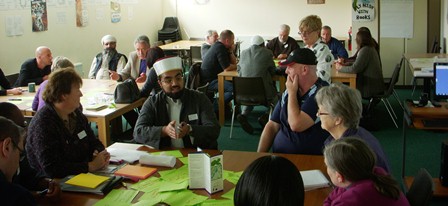

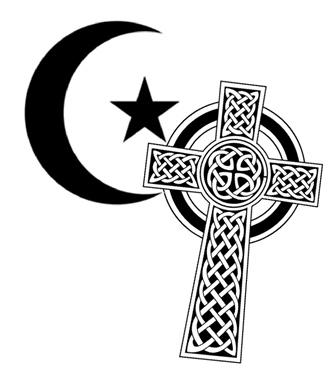
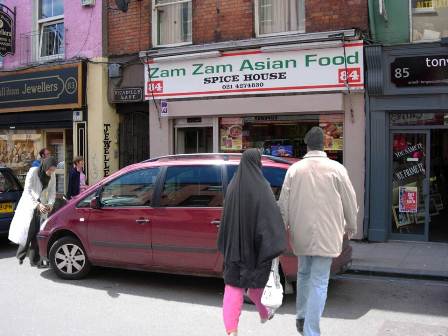 GREETINGS: “As-Salamu Alaikum” (Peace be upon you) is the norm al greeting that Muslims use with each other. While a tiny minority reserve its use for Muslims only, the vast majority of Muslims are happy and will not be offended if a non-Muslim greets them in this way. The response to this greeting is “Wa-alaikum as-Salam” (And Peace be upon you too).
GREETINGS: “As-Salamu Alaikum” (Peace be upon you) is the norm al greeting that Muslims use with each other. While a tiny minority reserve its use for Muslims only, the vast majority of Muslims are happy and will not be offended if a non-Muslim greets them in this way. The response to this greeting is “Wa-alaikum as-Salam” (And Peace be upon you too).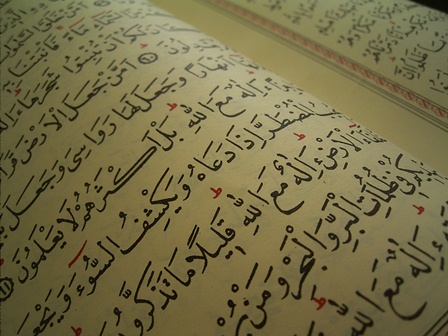
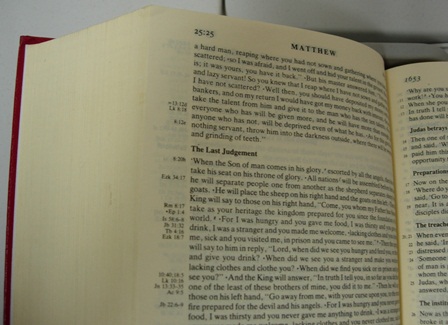
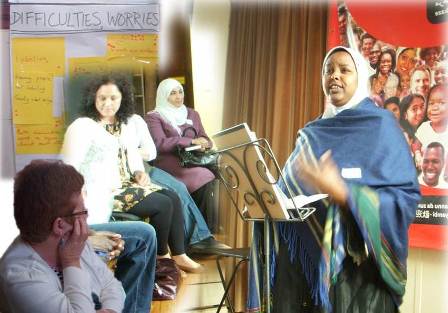
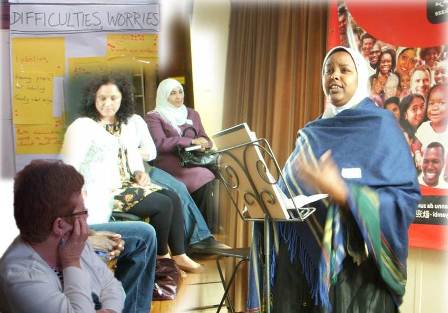
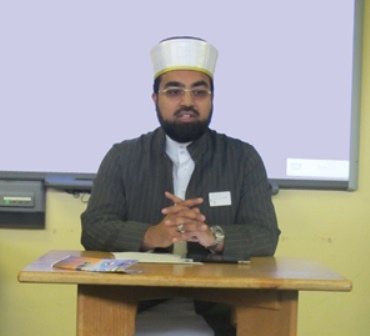 Speaking at a recent Muslim Christian Workshop in Limerick Sheikh Umar Al-Qadri quoted a saying (a Hadith) of the Prophet Muhammad (pbuh), about God speaking to a person on the Day of Judgement.
Speaking at a recent Muslim Christian Workshop in Limerick Sheikh Umar Al-Qadri quoted a saying (a Hadith) of the Prophet Muhammad (pbuh), about God speaking to a person on the Day of Judgement. 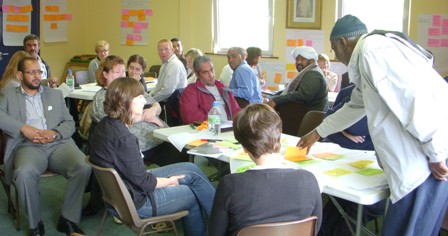
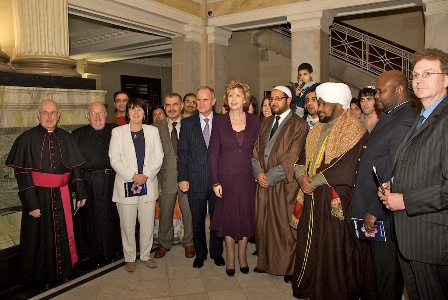
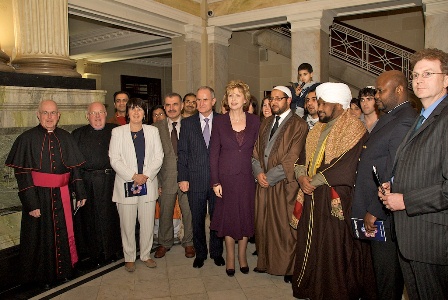
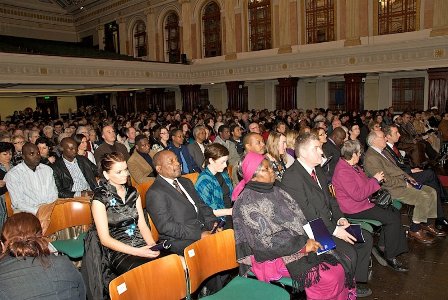
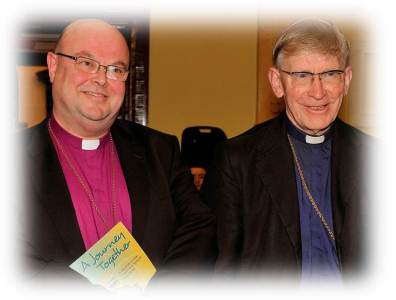


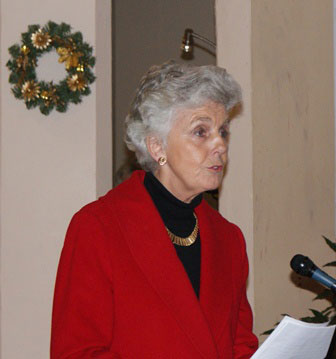
 “It was founded in 1853 by John Francis Maguire to give assistance to victims of the great famine. Since then social conditions have improved but there are other problems. In 2012 so many people in our community can become marginalised due to unexpected circumstances. Families often find themselves under severe financial pressure due to
“It was founded in 1853 by John Francis Maguire to give assistance to victims of the great famine. Since then social conditions have improved but there are other problems. In 2012 so many people in our community can become marginalised due to unexpected circumstances. Families often find themselves under severe financial pressure due to  unemployment, illness, bereavement and harmful addiction, separation, unequal access to opportunities and other forms of discrimination. The task of the Sick Poor Society is to reach out to such families who are in these difficult circumstances and to provide them with material and other assistance. This work is undertaken on a voluntary basis and all monies are used solely for the benefit of needy families” was how Kay Burke [pictured left] described the charity during the Service.
unemployment, illness, bereavement and harmful addiction, separation, unequal access to opportunities and other forms of discrimination. The task of the Sick Poor Society is to reach out to such families who are in these difficult circumstances and to provide them with material and other assistance. This work is undertaken on a voluntary basis and all monies are used solely for the benefit of needy families” was how Kay Burke [pictured left] described the charity during the Service.
 money but they desperately wanted to buy each other a Christmas present. As they were a very happy couple, they knew each other’s greatest wish – Della had beautiful long hair which reached below her knees and she longed to be able to buy tortoise shell jewelled combs to keep her hair in place. Jim had a gold watch which belonged to his father and grandfather but he had no gold chain from which to hang it. He had it on an old leather strap – he used to be so embarrassed if he was asked the time and had to pull his watch out of his pocket.
money but they desperately wanted to buy each other a Christmas present. As they were a very happy couple, they knew each other’s greatest wish – Della had beautiful long hair which reached below her knees and she longed to be able to buy tortoise shell jewelled combs to keep her hair in place. Jim had a gold watch which belonged to his father and grandfather but he had no gold chain from which to hang it. He had it on an old leather strap – he used to be so embarrassed if he was asked the time and had to pull his watch out of his pocket. Concluding her reflection, Kay invited us to pray:
Concluding her reflection, Kay invited us to pray: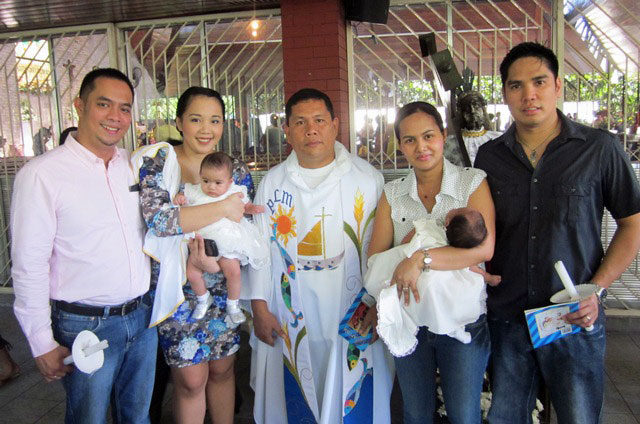


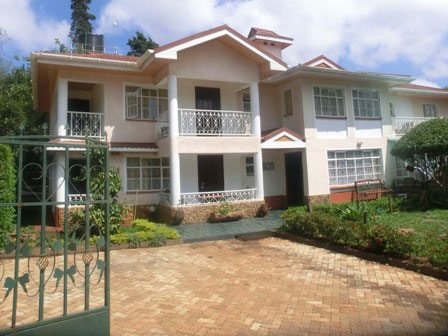

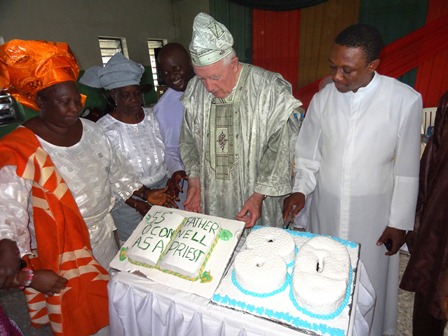

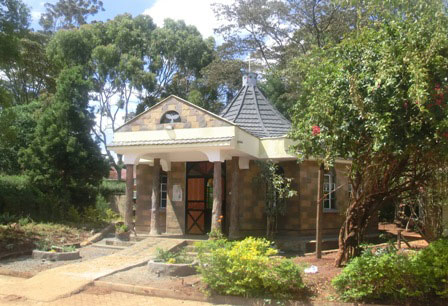
 It is called this because of its location. It is one of the three new sections or divisions of our Society in Africa which, hopefully soon, will assume the status of a District when it has a sufficient membership and some degree of autonomy so that it can manage its own mission apostolate. Until then it is called a District-in-Formation.
It is called this because of its location. It is one of the three new sections or divisions of our Society in Africa which, hopefully soon, will assume the status of a District when it has a sufficient membership and some degree of autonomy so that it can manage its own mission apostolate. Until then it is called a District-in-Formation. 
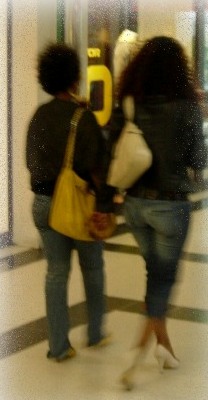
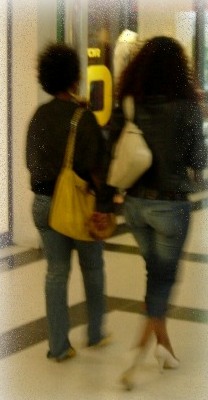 The points below list things that can be done to reduce and stop the suffering caused by trafficking and to deal with traffickers.
The points below list things that can be done to reduce and stop the suffering caused by trafficking and to deal with traffickers.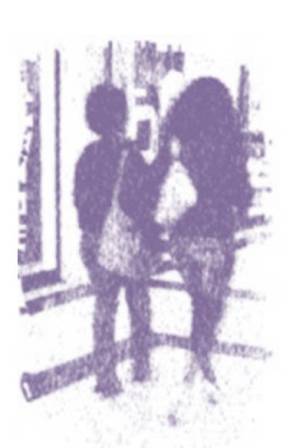
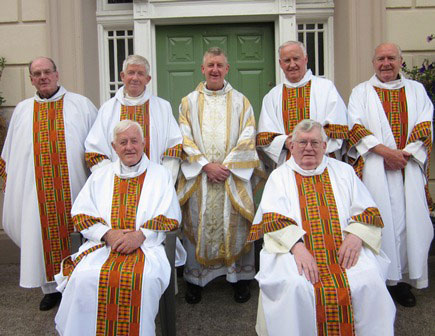

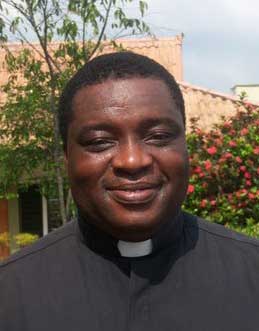
 – Basil Babatunde Soyoye was born on 6 June 1964 to Benedict and Felicia (née Adelakan) Soyoye. His parents hail from Abeokuta, Ogun State in Nigeria. He was the third born of seven children (4 girls and 3 boys). Basil’s middle name – Babatunde – indicates that one of his grandfathers had died shortly before his birth and in his memory he was given that name which means ‘the father has returned’. Thank God, both of Basil’s parents are still hale and hearty in Lagos, Nigeria.
– Basil Babatunde Soyoye was born on 6 June 1964 to Benedict and Felicia (née Adelakan) Soyoye. His parents hail from Abeokuta, Ogun State in Nigeria. He was the third born of seven children (4 girls and 3 boys). Basil’s middle name – Babatunde – indicates that one of his grandfathers had died shortly before his birth and in his memory he was given that name which means ‘the father has returned’. Thank God, both of Basil’s parents are still hale and hearty in Lagos, Nigeria.

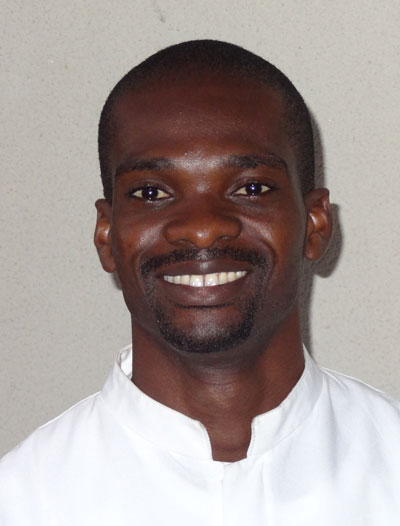
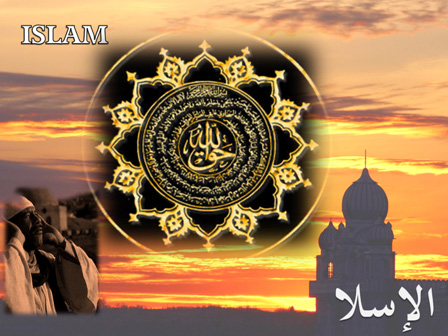

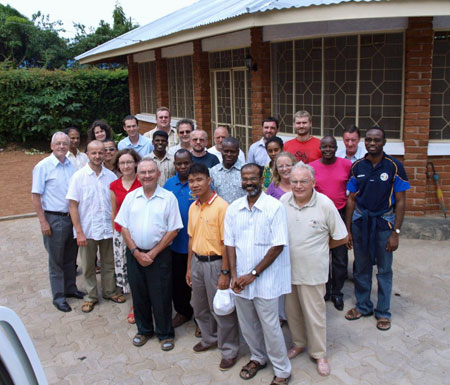

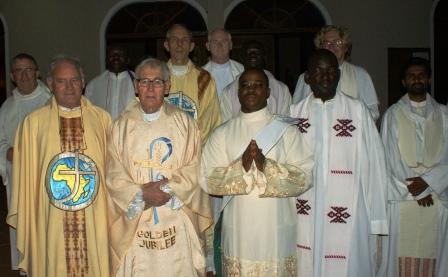
 Fr. John O’Hea, brother of Fr James, came to Ibadan in 1961 and his first appointment was to Fatima College, Ikire. He also taught at St. Theresa’s Seminary. Then he was Parish Priest at St. Anthony’s, Iwo, and then at St. Cyrpian’s, Oke Offa. Next he was Administrator of the Cathedral and then he was Parish Priest of St. Peter’s Apata.
Fr. John O’Hea, brother of Fr James, came to Ibadan in 1961 and his first appointment was to Fatima College, Ikire. He also taught at St. Theresa’s Seminary. Then he was Parish Priest at St. Anthony’s, Iwo, and then at St. Cyrpian’s, Oke Offa. Next he was Administrator of the Cathedral and then he was Parish Priest of St. Peter’s Apata. Mo Farah is now a household name. But not until this year’s Olympic Games in London, where he won two gold medals in running for Great Britain. Mo Farah is from Somalia and came to the UK as a child. African born athletes also gained gold for the United States, as well as for their own countries of course.
Mo Farah is now a household name. But not until this year’s Olympic Games in London, where he won two gold medals in running for Great Britain. Mo Farah is from Somalia and came to the UK as a child. African born athletes also gained gold for the United States, as well as for their own countries of course.
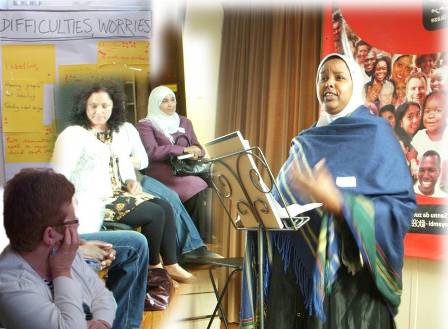

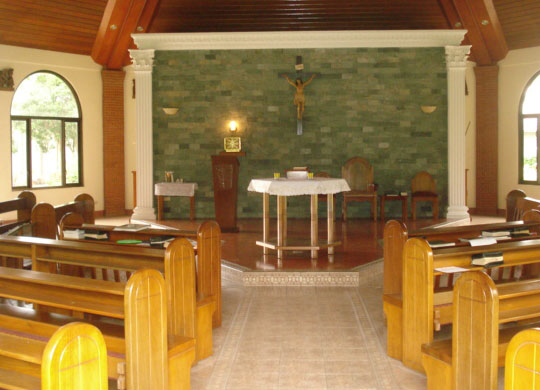

 The ceremony will be presided over by the SMA Superior General, Fr Jean-Marie Guillaume, who is on an Official Visit to the Philippines and India.
The ceremony will be presided over by the SMA Superior General, Fr Jean-Marie Guillaume, who is on an Official Visit to the Philippines and India.
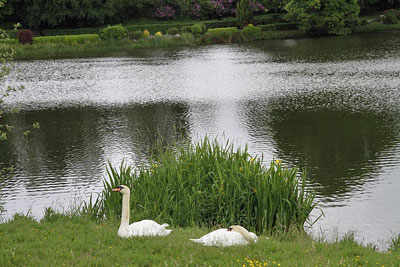
 Two years ago I met a man who had just returned from England where he visited his brother. The Social Services in England had contacted him because his brother was old and badly undernourished. He had his own house but it was clearly very neglected and dirty. After visiting his brother in hospital he returned to the house to try and clean up the place. Imagine his great surprise when he found almost a quarter of a million pounds sterling hidden in a suitcase in an old cupboard. His brother had been a lawyer, and obviously a successful one but since the death of his wife had neglected himself badly. If this brother had made use of the money in the suitcase he could have had a very comfortable lifestyle. But he didn’t do so and suffered the consequences.
Two years ago I met a man who had just returned from England where he visited his brother. The Social Services in England had contacted him because his brother was old and badly undernourished. He had his own house but it was clearly very neglected and dirty. After visiting his brother in hospital he returned to the house to try and clean up the place. Imagine his great surprise when he found almost a quarter of a million pounds sterling hidden in a suitcase in an old cupboard. His brother had been a lawyer, and obviously a successful one but since the death of his wife had neglected himself badly. If this brother had made use of the money in the suitcase he could have had a very comfortable lifestyle. But he didn’t do so and suffered the consequences.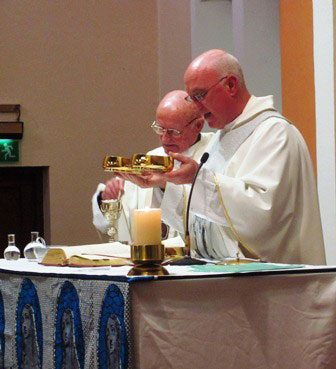
 Devotion to Christ’s mother has been a constant feature of both the Catholic and orthodox traditions since the beginning. Christ’s mother is ours too as members of Christ’s body.
Devotion to Christ’s mother has been a constant feature of both the Catholic and orthodox traditions since the beginning. Christ’s mother is ours too as members of Christ’s body.
 She is the observant woman at the feast – sees the difficulty about to arise and knows that there is only one present who can save the situation. She goes to her son, Jesus and pleads – and she goes to the servants and gives them the instruction ‘Do whatever he tells you’.
She is the observant woman at the feast – sees the difficulty about to arise and knows that there is only one present who can save the situation. She goes to her son, Jesus and pleads – and she goes to the servants and gives them the instruction ‘Do whatever he tells you’.

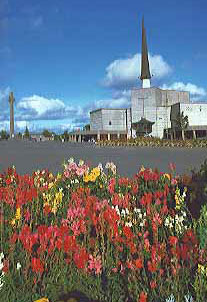

 For the apostles the Ascension meant three things
For the apostles the Ascension meant three things 
 Author Dr. DeWan states: “It was very important to all of us involved in Open Secrets that the focus be on developing ways to provide non-judgmental and culturally-aware support for victims, whether they are dealing with witchcraft in their lives or are trying to come to terms with the violent and traumatic experience of being trafficked.”
Author Dr. DeWan states: “It was very important to all of us involved in Open Secrets that the focus be on developing ways to provide non-judgmental and culturally-aware support for victims, whether they are dealing with witchcraft in their lives or are trying to come to terms with the violent and traumatic experience of being trafficked.”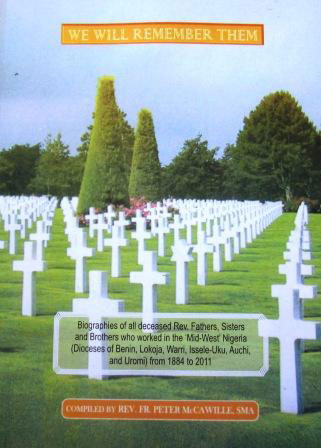
 We will remember them is the title of a book written by SMA Fr Peter McCawille. It is a timely memoir of the early SMA, other missionaries and diocesan clergy and religious who worked in what was known in the past as MidWest Nigeria. Today it covers Bayelsa, Delta and Edo states in the 36 State Federal Republic of Nigeria. It covers the period from the death of the first missionary in 1884 until 2011.
We will remember them is the title of a book written by SMA Fr Peter McCawille. It is a timely memoir of the early SMA, other missionaries and diocesan clergy and religious who worked in what was known in the past as MidWest Nigeria. Today it covers Bayelsa, Delta and Edo states in the 36 State Federal Republic of Nigeria. It covers the period from the death of the first missionary in 1884 until 2011.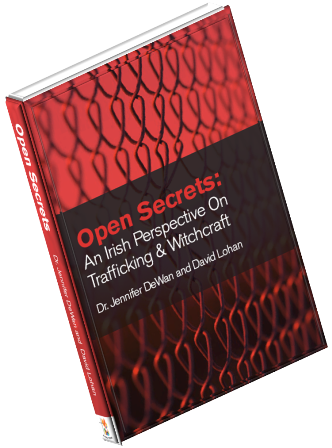
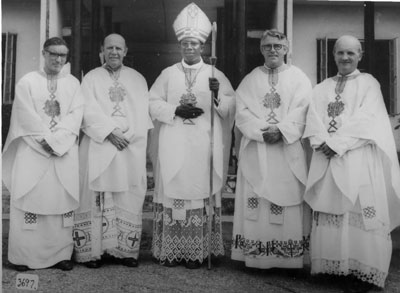

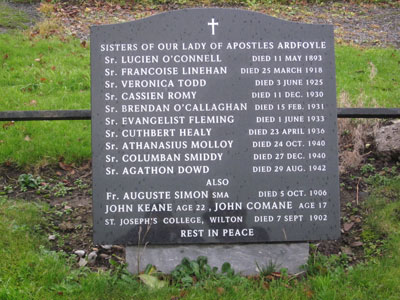


 Fr Dennis Kofi Agbenyadzi SMA has been appointed by Pope Benedict XVI as Bishop of Berbérati in the south-west of the Central African Republic (CAR).
Fr Dennis Kofi Agbenyadzi SMA has been appointed by Pope Benedict XVI as Bishop of Berbérati in the south-west of the Central African Republic (CAR).
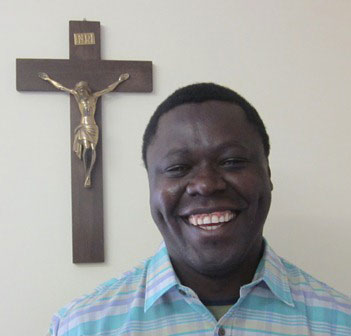
 Fr Nestor Désiré Nongo-Aziagbia SMA has been appointed by Pope Benedict XVI as Bishop of Bossangoa in the north-west of the Central African Republic.
Fr Nestor Désiré Nongo-Aziagbia SMA has been appointed by Pope Benedict XVI as Bishop of Bossangoa in the north-west of the Central African Republic.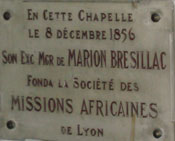
 One of Fr Planque’s major decisions was to seek English-speaking members for the Society in order to proclaim the Gospel in English-speaking parts of south and west Africa. He sent priests to Ireland to establish a foundation in Cork. The first of them, Fr Francois Devoucoux, arrived in May 1877. With the help of Bishop O’Callaghan OP of the diocese of Cork and the support of many lay people, women and men, the new branch in Ireland began to grow.
One of Fr Planque’s major decisions was to seek English-speaking members for the Society in order to proclaim the Gospel in English-speaking parts of south and west Africa. He sent priests to Ireland to establish a foundation in Cork. The first of them, Fr Francois Devoucoux, arrived in May 1877. With the help of Bishop O’Callaghan OP of the diocese of Cork and the support of many lay people, women and men, the new branch in Ireland began to grow. 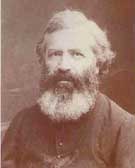
 In 1883, Fr Planque sent a Swiss SMA, Fr Joseph Zimmerman, pictured left, to lead the work in Ireland. Fr Zimmerman saw that having some property in Cork would help to bring in a steady income for the upkeep of the Irish branch of the Society. And so properties were acquired on Blackrock Road (for houses) and houses on Ballyhooley Road. The Society also bought St Joseph’s Cemetery from the Capuchins. Over the years these properties were disposed of to help with the growing cost of mission work in Africa.
In 1883, Fr Planque sent a Swiss SMA, Fr Joseph Zimmerman, pictured left, to lead the work in Ireland. Fr Zimmerman saw that having some property in Cork would help to bring in a steady income for the upkeep of the Irish branch of the Society. And so properties were acquired on Blackrock Road (for houses) and houses on Ballyhooley Road. The Society also bought St Joseph’s Cemetery from the Capuchins. Over the years these properties were disposed of to help with the growing cost of mission work in Africa. contact with the Society: Llewellyn Blake, a landowner in the west of Ireland. His property at Ballinafad, Co Mayo became the Sacred Heart College and a second property, at Cloughballymore, Co Galway, served as a Novitiate and Philosophy School for the Society.
contact with the Society: Llewellyn Blake, a landowner in the west of Ireland. His property at Ballinafad, Co Mayo became the Sacred Heart College and a second property, at Cloughballymore, Co Galway, served as a Novitiate and Philosophy School for the Society. A picture of the old entrance to Blackrock Road
A picture of the old entrance to Blackrock Road opaganda Fide had decided to make Ireland a semi-independent part of the SMA and he was to be its first Superior.
opaganda Fide had decided to make Ireland a semi-independent part of the SMA and he was to be its first Superior.
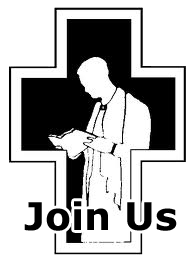







 “Lorem ipsum dolor sit amet, consectetur adipisicing elit, sed do eiusmod tempor incididunt ut labore et dolore magna aliqua. Ut enim ad minim veniam
“Lorem ipsum dolor sit amet, consectetur adipisicing elit, sed do eiusmod tempor incididunt ut labore et dolore magna aliqua. Ut enim ad minim veniam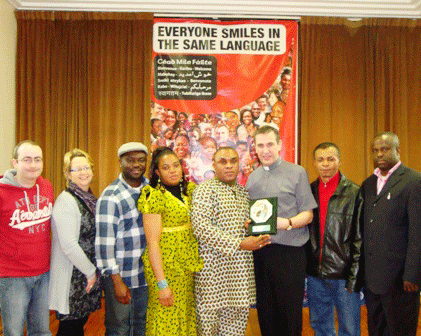

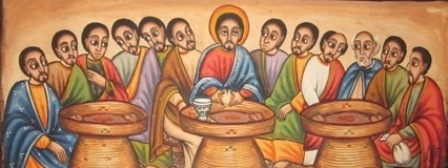

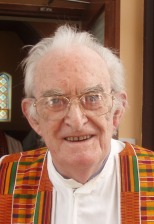


 At the Offertory of the Mass several symbols of Fr Der’s life were presented:
At the Offertory of the Mass several symbols of Fr Der’s life were presented: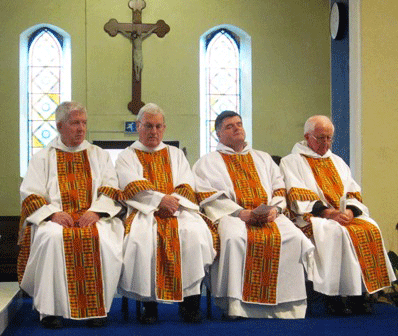


 Our first reading also reminds us of what it means to respond to God’s call. For each person there is a purpose in the call we receive. In Der Healy’s life it was a call to respond to the God who called him to be a missionary. He was sent to bring good news to the poor, to bind hearts that are broken and to proclaim liberty to captives. This highlights what any vocation, but particularly the missionary vocation, is all about.
Our first reading also reminds us of what it means to respond to God’s call. For each person there is a purpose in the call we receive. In Der Healy’s life it was a call to respond to the God who called him to be a missionary. He was sent to bring good news to the poor, to bind hearts that are broken and to proclaim liberty to captives. This highlights what any vocation, but particularly the missionary vocation, is all about. If we are to know and follow the deep desire of the heart and fulfil the dream of God in our lives we surely need some help and guidance. This task cannot be accomplished alone! But we are not left to our own devices. Our loving and gracious God chose to accompany us in various ways at various different times to ensure that the goal would be achieved. We believe and celebrate in a special way during this time of Holy Week that God sent his Son, Jesus, who in turn promised to be for all the Way, the Truth and the Life.
If we are to know and follow the deep desire of the heart and fulfil the dream of God in our lives we surely need some help and guidance. This task cannot be accomplished alone! But we are not left to our own devices. Our loving and gracious God chose to accompany us in various ways at various different times to ensure that the goal would be achieved. We believe and celebrate in a special way during this time of Holy Week that God sent his Son, Jesus, who in turn promised to be for all the Way, the Truth and the Life.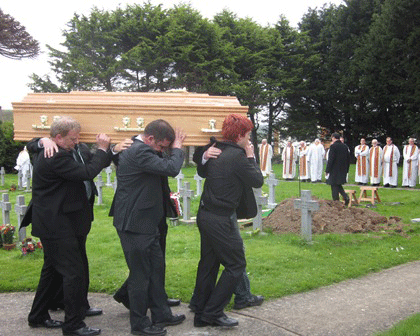

 37 years ago, when he was editor of SMA magazine Fr. Der formed a very special friendship with Hilda Kilraine, who became one of his closest confidante and friends. They travelled to many corners of the world together and shared so many happy memories and times together. It was fitting that Hilda was with Fr Der in his final days. The family would like to pay a special tribute to you Hilda for the true friendship, support and care you gave Fr. Der over the last 37 years. Hilda cared a lot for uncle Der and he cared equally for her.
37 years ago, when he was editor of SMA magazine Fr. Der formed a very special friendship with Hilda Kilraine, who became one of his closest confidante and friends. They travelled to many corners of the world together and shared so many happy memories and times together. It was fitting that Hilda was with Fr Der in his final days. The family would like to pay a special tribute to you Hilda for the true friendship, support and care you gave Fr. Der over the last 37 years. Hilda cared a lot for uncle Der and he cared equally for her.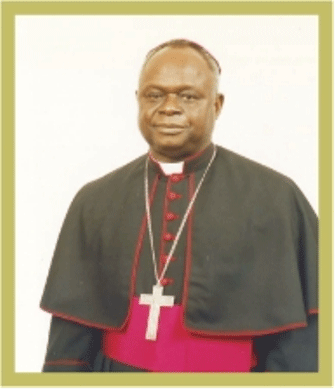
 On the occasion of the Mass to celebrate 150 years of missionary endeavour in part of Nigeria, Most Rev Anthony Okonkwo Gbuji, Bishop Emeritus of Enugu, was invited to preach.
On the occasion of the Mass to celebrate 150 years of missionary endeavour in part of Nigeria, Most Rev Anthony Okonkwo Gbuji, Bishop Emeritus of Enugu, was invited to preach. THE SMA IN BENIN CITY PROVINCE
THE SMA IN BENIN CITY PROVINCE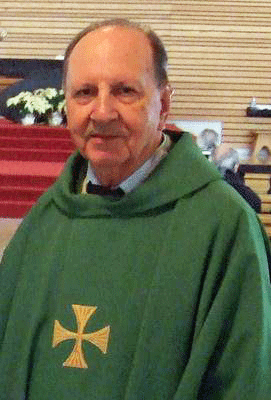

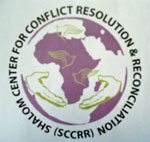
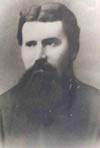
 be some years before the SMA actually arrived there for missionary work.
be some years before the SMA actually arrived there for missionary work. The Western World first began paying attention to refugees after World War II, when hundreds of thousands of civilians in mainland Europe were displaced after so many cities were bombed, some almost razed to the ground.
The Western World first began paying attention to refugees after World War II, when hundreds of thousands of civilians in mainland Europe were displaced after so many cities were bombed, some almost razed to the ground. 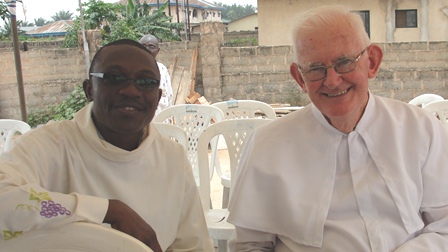
 On Saturday, 17 March, 2012, the Feast of St. Patrick (Secondary Patron of Nigeria) a special Anniversary Mass was celebrated at St. Andrew’s Church, Ugbighoko, Benin City. It was to recall and celebrate 150 years of SMA missionary endeavour in this part of the Lord’s vineyard.
On Saturday, 17 March, 2012, the Feast of St. Patrick (Secondary Patron of Nigeria) a special Anniversary Mass was celebrated at St. Andrew’s Church, Ugbighoko, Benin City. It was to recall and celebrate 150 years of SMA missionary endeavour in this part of the Lord’s vineyard. The book took nearly three years of intensive and extensive research before it saw the light of day. As the author states in the introduction: ‘If those memories can inspire you to be an even more committed member of Christ’s faithful in the future the energy expended on its production will have been worthwhile’.
The book took nearly three years of intensive and extensive research before it saw the light of day. As the author states in the introduction: ‘If those memories can inspire you to be an even more committed member of Christ’s faithful in the future the energy expended on its production will have been worthwhile’.
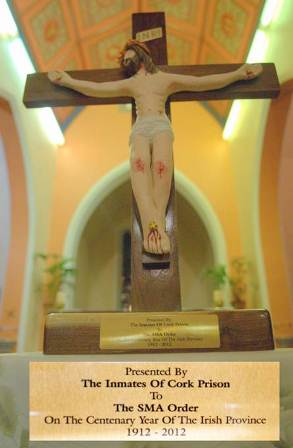
 rk Prison staff and inmates celebrate SMA 100th
rk Prison staff and inmates celebrate SMA 100th

 There are examples of community based projects, producing vegetables and other crops. Shea Butter is being processed for the cosmetics industry. There is also local use wild of Jathroba Tree Beans that could be developed into biofuel crop production. People are willing to work to support themselves and because of this there is hope. What makes all of these projects work is that they are locally owned and controlled by people who have a vested interest in maintaining their livelihoods. Imagine if these projects could be multiplied a thousand or even ten thousand times. Small local projects can provide sustainable livelihoods in an environmentally friendly and even renewing way. A key element in their success is local ownership. No doubt replicating these projects will require support from African Governments. The western world, as the major cause of climate change, has a responsibility to be part of the solution. The latest climate change summit in Cancun has agreed to set up a fund to help affected nations deal with the effects of climate change. However it is not yet in place and not yet available to nations such as Ghana. Hopefully the next Climate Change Conference in Durban in 2011 will lead to practical implementation.
There are examples of community based projects, producing vegetables and other crops. Shea Butter is being processed for the cosmetics industry. There is also local use wild of Jathroba Tree Beans that could be developed into biofuel crop production. People are willing to work to support themselves and because of this there is hope. What makes all of these projects work is that they are locally owned and controlled by people who have a vested interest in maintaining their livelihoods. Imagine if these projects could be multiplied a thousand or even ten thousand times. Small local projects can provide sustainable livelihoods in an environmentally friendly and even renewing way. A key element in their success is local ownership. No doubt replicating these projects will require support from African Governments. The western world, as the major cause of climate change, has a responsibility to be part of the solution. The latest climate change summit in Cancun has agreed to set up a fund to help affected nations deal with the effects of climate change. However it is not yet in place and not yet available to nations such as Ghana. Hopefully the next Climate Change Conference in Durban in 2011 will lead to practical implementation. reducing its CO2 emissions. The developed world also has a more immediate responsibility to support projects on the ground in places like Ghana. This will constructively buy time for gas emissions to be cut, sustain lives and at the same time protect and renew local environments. The most important thing is that it is done in a “hands-off” way. If local people own, control and benefit from projects then they will have the greatest chance of success. The developed world can play a constructive role by providing the expertise and investment that supports local people to build environmentally sustainable livelihoods that they control. While African Governments need to be involved this should also be in a “hands off” way. New oil revenue could allow Ghana’s government to build infrastructure and develop the business links and practical support for locally owned projects to be put in place.
reducing its CO2 emissions. The developed world also has a more immediate responsibility to support projects on the ground in places like Ghana. This will constructively buy time for gas emissions to be cut, sustain lives and at the same time protect and renew local environments. The most important thing is that it is done in a “hands-off” way. If local people own, control and benefit from projects then they will have the greatest chance of success. The developed world can play a constructive role by providing the expertise and investment that supports local people to build environmentally sustainable livelihoods that they control. While African Governments need to be involved this should also be in a “hands off” way. New oil revenue could allow Ghana’s government to build infrastructure and develop the business links and practical support for locally owned projects to be put in place. Can this happen?
Can this happen?  Barack Obama, is a hero in Ghana – living testament that Ghanaians can achieve greatness. “Yes we can” his campaign cry has been adopted as a statement of faith in Ghana’s ability to continue on the road to success. We can too – What we do matters very much. Even long before Barack Obama became President Ghanaians already had a proverb that placed the potential of individual effort into context. “If you think you’re too small to make a difference, try sleeping in a room with a mosquito.”
Barack Obama, is a hero in Ghana – living testament that Ghanaians can achieve greatness. “Yes we can” his campaign cry has been adopted as a statement of faith in Ghana’s ability to continue on the road to success. We can too – What we do matters very much. Even long before Barack Obama became President Ghanaians already had a proverb that placed the potential of individual effort into context. “If you think you’re too small to make a difference, try sleeping in a room with a mosquito.”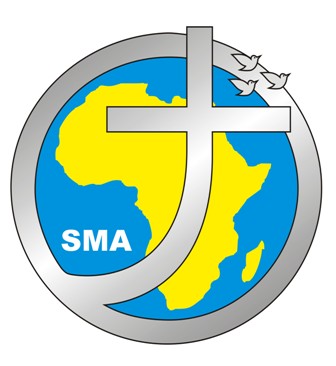




 With the end of PC 2011, the journey towards GA 2013 has begun for the world Society. As we say farewell to one another and to Tenafly, the readings of today have some insights for us: both reading are about farewell addresses – Paul to the people of Miletus, and Christ at the last Supper.
With the end of PC 2011, the journey towards GA 2013 has begun for the world Society. As we say farewell to one another and to Tenafly, the readings of today have some insights for us: both reading are about farewell addresses – Paul to the people of Miletus, and Christ at the last Supper.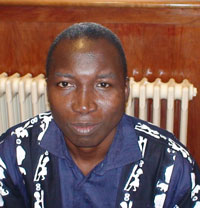
 I would also like to thank the members who helped make the running of the Plenary Council a success: I would like to begin with Alexis, the Francophone Secretary (pictured left). I take this opportunity to officially announce that Alexis ends his three-year term as Secretary in Rome. He will, however, remain in Rome as a student and we will ask him to take up a service of leadership, which has yet to be clarified, in our community in Rome. During the Plenary Councils in which Alexis has participated, he has shown an excellent talent as a translator. The Gospels tell us that we ought not to bury talents in the ground, and I am sure that, in the future, we will give to Alexis the chance to develop further this talent.
I would also like to thank the members who helped make the running of the Plenary Council a success: I would like to begin with Alexis, the Francophone Secretary (pictured left). I take this opportunity to officially announce that Alexis ends his three-year term as Secretary in Rome. He will, however, remain in Rome as a student and we will ask him to take up a service of leadership, which has yet to be clarified, in our community in Rome. During the Plenary Councils in which Alexis has participated, he has shown an excellent talent as a translator. The Gospels tell us that we ought not to bury talents in the ground, and I am sure that, in the future, we will give to Alexis the chance to develop further this talent. Pictured right are Frs Maurice Henry, Regional Superior in Nigeria (from Clara, Co Offaly) and Thaddeus Ogato, Superior of the Great Lakes DF (Kenya).
Pictured right are Frs Maurice Henry, Regional Superior in Nigeria (from Clara, Co Offaly) and Thaddeus Ogato, Superior of the Great Lakes DF (Kenya).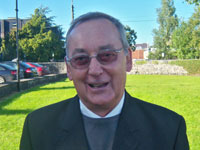




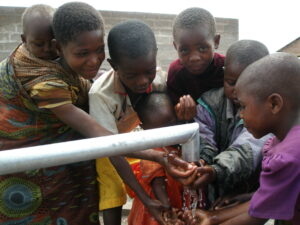
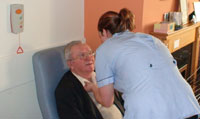



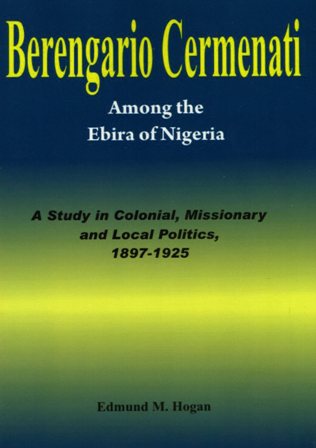
 This book charts the careers of three significant figures in the history of the Ebira (a small ethnic group in Nigeria’s Middle belt): an Italian Missionary, a British Administrator, and the group’s young Ruler.
This book charts the careers of three significant figures in the history of the Ebira (a small ethnic group in Nigeria’s Middle belt): an Italian Missionary, a British Administrator, and the group’s young Ruler.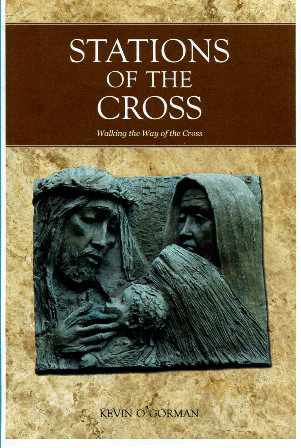
 Fr Kevin O’Gorman SMA is a native of Tipperary Town. He joined the SMA in 1976 and was ordained a priest in 1983. His first mission assignment was to Liberia in west Africa. He later transferred to South Africa where he was on the staff of St John Vianney Seminary, helping to train diocesan priests.
Fr Kevin O’Gorman SMA is a native of Tipperary Town. He joined the SMA in 1976 and was ordained a priest in 1983. His first mission assignment was to Liberia in west Africa. He later transferred to South Africa where he was on the staff of St John Vianney Seminary, helping to train diocesan priests.
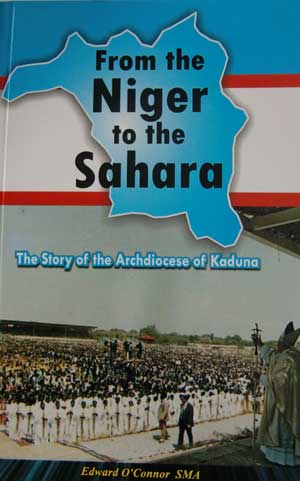

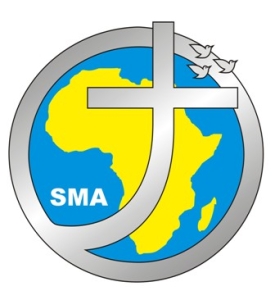
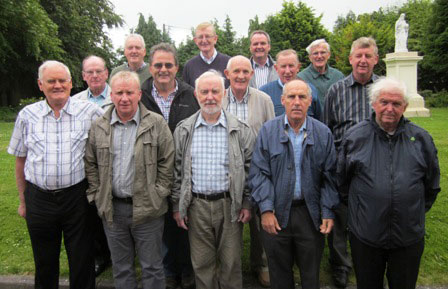

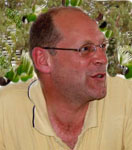







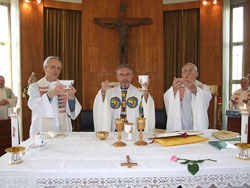
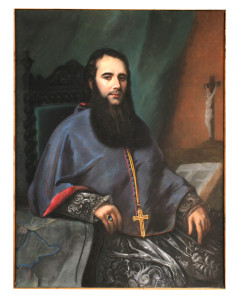
 Founding the Society of African Missions
Founding the Society of African Missions De Brésillac then prepared for his own departure. He arrived in Freetown, Sierra Leone on 14 May 1859 as the first Vicar Apostolic of Sierra Leone. He was accompanied by one priest and one brother. A cloud of gloom hung over the place as smallpox was devastating the African population and yellow fever the Europeans. On 2 June one of the first group who had been ill for a number of days, died. Three days later a second priest died suddenly and unexpectedly. Twelve days later one of the brothers died and a second one returned to France, leaving de Brésillac and just one priest. On 25 June 1859 de Brésillac died leaving only a critically ill Fr Reymond behind. There was no priest to offer a funeral Mass for the bishop or bless his grave. A protestant minister read the prayers over his grave.
De Brésillac then prepared for his own departure. He arrived in Freetown, Sierra Leone on 14 May 1859 as the first Vicar Apostolic of Sierra Leone. He was accompanied by one priest and one brother. A cloud of gloom hung over the place as smallpox was devastating the African population and yellow fever the Europeans. On 2 June one of the first group who had been ill for a number of days, died. Three days later a second priest died suddenly and unexpectedly. Twelve days later one of the brothers died and a second one returned to France, leaving de Brésillac and just one priest. On 25 June 1859 de Brésillac died leaving only a critically ill Fr Reymond behind. There was no priest to offer a funeral Mass for the bishop or bless his grave. A protestant minister read the prayers over his grave.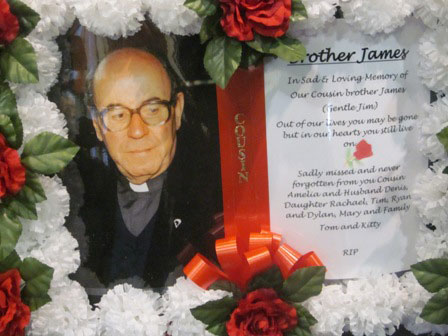
 Old Testament, the prophets spoke about a Jubilee year, a time when debts were forgiven, slaves set free, and right relationships restored. A Jubilee year is as much needed today as in biblical times.
Old Testament, the prophets spoke about a Jubilee year, a time when debts were forgiven, slaves set free, and right relationships restored. A Jubilee year is as much needed today as in biblical times.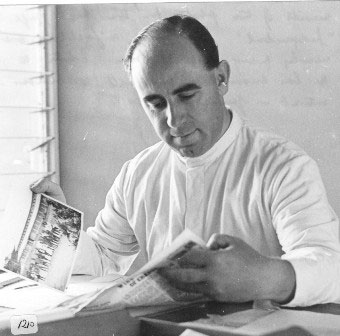
 The death has been announced of Brother James (Jim) Redmond. Br Jim died peacefully at 9.20am on Saturday, 25 February 2012 at St Theresa’s Nursing Unit, African Missions, Blackrock Road, Cork where he had lived since June 2011, after suffering a Stroke. Up to then, Br Jim had been living an active retirement in the African Missions, Wilton, his home since 1970.
The death has been announced of Brother James (Jim) Redmond. Br Jim died peacefully at 9.20am on Saturday, 25 February 2012 at St Theresa’s Nursing Unit, African Missions, Blackrock Road, Cork where he had lived since June 2011, after suffering a Stroke. Up to then, Br Jim had been living an active retirement in the African Missions, Wilton, his home since 1970. In 1960, Br Jim and Br Sean Murphy were appointed to Nigeria – Jim to Ibadan diocese and Br Sean to Kaduna. For the next ten years Jim was involved in pastoral work in Ibadan City as well as working as Manager of the Claverianum Press. It was during these years that his organizational skills came to the fore. He lived for a time at Oke-Ado as well as in the house built beside the Claverinum Press in Bodija. In July 1962 he, along with the Editor, Fr Tommie Blee, welcomed the then Cardinal Montini to the Press to see their work. A short time later, Cardinal Montini was elected Pope Paul VI. Our picture shows Fr Blee, Br Jim and Sr Juliana to the left of Cardinal Montini.
In 1960, Br Jim and Br Sean Murphy were appointed to Nigeria – Jim to Ibadan diocese and Br Sean to Kaduna. For the next ten years Jim was involved in pastoral work in Ibadan City as well as working as Manager of the Claverianum Press. It was during these years that his organizational skills came to the fore. He lived for a time at Oke-Ado as well as in the house built beside the Claverinum Press in Bodija. In July 1962 he, along with the Editor, Fr Tommie Blee, welcomed the then Cardinal Montini to the Press to see their work. A short time later, Cardinal Montini was elected Pope Paul VI. Our picture shows Fr Blee, Br Jim and Sr Juliana to the left of Cardinal Montini. Br Jim was the Founder and Leader of the Choir in the SMA Wilton parish. He was diligent about playing the Organ at Sunday Mass as well as providing for the Music at SMA events – Funerals, Jubilees and our Annual Knock Pilgrimage.
Br Jim was the Founder and Leader of the Choir in the SMA Wilton parish. He was diligent about playing the Organ at Sunday Mass as well as providing for the Music at SMA events – Funerals, Jubilees and our Annual Knock Pilgrimage.
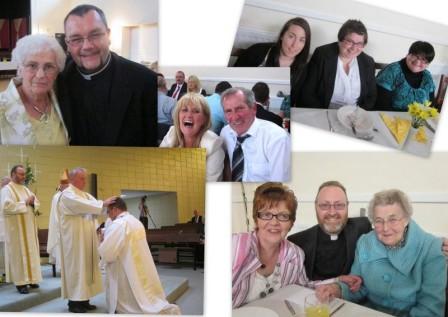

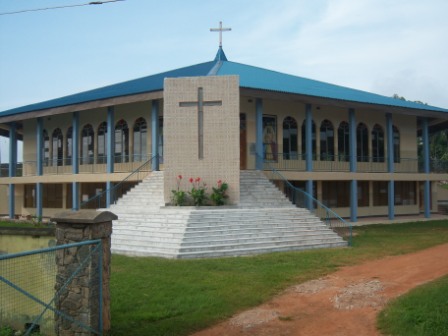

 Fr. Whelan was ordained in 1956 and after he graduated in science in 1961 he was appointed to Ondo Diocese and worked there almost continuously till 1996. He taught science at Sacred Heart Seminary and later at Aquinas College and also at Stella Maris College Okitipupa. As well as being a dedicated teacher he was a great footballer. He had already won a Cup Final with University College Cork in 1961. I was at that final and was amazed that Fr. Whelan who was a fairly small man, could jump so high for the ball. In the schools in Ondo he was a great coach both in football and athletics. Due to his coaching many of his students won medals.
Fr. Whelan was ordained in 1956 and after he graduated in science in 1961 he was appointed to Ondo Diocese and worked there almost continuously till 1996. He taught science at Sacred Heart Seminary and later at Aquinas College and also at Stella Maris College Okitipupa. As well as being a dedicated teacher he was a great footballer. He had already won a Cup Final with University College Cork in 1961. I was at that final and was amazed that Fr. Whelan who was a fairly small man, could jump so high for the ball. In the schools in Ondo he was a great coach both in football and athletics. Due to his coaching many of his students won medals. Fr. Cahill was ordained in 1961 and was also appointed to Ondo and arrived there in 1962 and worked there in the Parishes of Owo, Okitipupo, Irele and Ondo – where he was made a chief. He was elected Deputy Regional Superior of the SMA in 1989 and remained in that post until 1995. During these years he was also Parish Priest here at St. Leo’s and it was chiefly through his efforts that the outstations of Good Shepherd, St. Anthony’s and St. Charles Lwanga were opened. Many members of the parish here remember him not only for his dedicated work in the Parish, but also for sense of humour and the way he delighted in starting an argument which were never intended to be serious.
Fr. Cahill was ordained in 1961 and was also appointed to Ondo and arrived there in 1962 and worked there in the Parishes of Owo, Okitipupo, Irele and Ondo – where he was made a chief. He was elected Deputy Regional Superior of the SMA in 1989 and remained in that post until 1995. During these years he was also Parish Priest here at St. Leo’s and it was chiefly through his efforts that the outstations of Good Shepherd, St. Anthony’s and St. Charles Lwanga were opened. Many members of the parish here remember him not only for his dedicated work in the Parish, but also for sense of humour and the way he delighted in starting an argument which were never intended to be serious.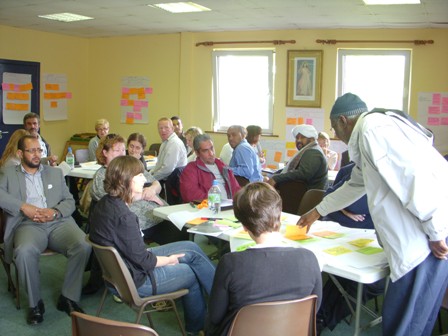
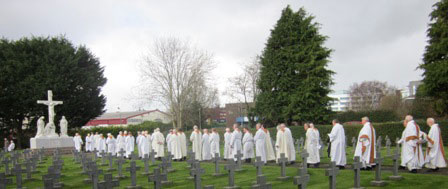


 There is a proverb from Burkino Faso which states, Man has two feet but he cannot follow two paths at the same time. Whatever about Micheal’s two feet, it is good to focus for awhile now on his determination to follow just one path in life. He was born in Craughwell, Co Galway in 1936. He was always very proud of his native soil. Being the youngest of ten children I suppose it was inevitable that he would be something of a pet to his older siblings. Of course it was one of the lovely features of Michael’s personality that he attracted very strong and enduring friendships throughout his life. Today’s second reading from St John is so aptly chosen. It speaks to us of loving our brothers and sisters. Certainly, if it ever needed proof that Mick was loved by his brothers and sisters – not just the nuclear family but a wide circle of devoted friends – the last few years and especially last months revealed just how warmly Mick was held in the affection of many. The regular and frequent visits of his sisters, nephews and nieces, the extraordinary devotion of his very special and good female friends, the wonderful care from all staff members of SMA House, Blackrock Road and the affectionate enquiry of his health condition from almost anyone who had more than a brief encounter with him in life, is a fitting testimony to the love that Mick brought to so many people’s lives.
There is a proverb from Burkino Faso which states, Man has two feet but he cannot follow two paths at the same time. Whatever about Micheal’s two feet, it is good to focus for awhile now on his determination to follow just one path in life. He was born in Craughwell, Co Galway in 1936. He was always very proud of his native soil. Being the youngest of ten children I suppose it was inevitable that he would be something of a pet to his older siblings. Of course it was one of the lovely features of Michael’s personality that he attracted very strong and enduring friendships throughout his life. Today’s second reading from St John is so aptly chosen. It speaks to us of loving our brothers and sisters. Certainly, if it ever needed proof that Mick was loved by his brothers and sisters – not just the nuclear family but a wide circle of devoted friends – the last few years and especially last months revealed just how warmly Mick was held in the affection of many. The regular and frequent visits of his sisters, nephews and nieces, the extraordinary devotion of his very special and good female friends, the wonderful care from all staff members of SMA House, Blackrock Road and the affectionate enquiry of his health condition from almost anyone who had more than a brief encounter with him in life, is a fitting testimony to the love that Mick brought to so many people’s lives.
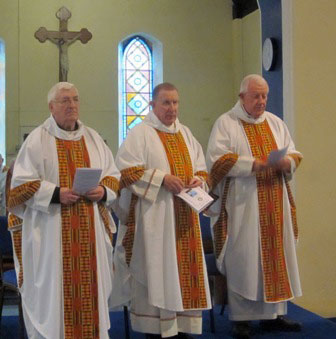
 The principal concelebrants were two classmates of Fr Paddy: Frs Vincent Lawless and Mattie O’Connell (home on leave from Ondo diocese, Nigeria) and the SMA Claregalway community Leader, Fr Seamus Nohilly SMA.
The principal concelebrants were two classmates of Fr Paddy: Frs Vincent Lawless and Mattie O’Connell (home on leave from Ondo diocese, Nigeria) and the SMA Claregalway community Leader, Fr Seamus Nohilly SMA. Paddy was born one month short of eighty years ago in Sylane, Belclare, in the parish of Corofin, Co Galway. He took a very healthy pride in his county all through his life and rejoiced especially at Galway’s many victories on the GAA fields. He attended local primary school after which he went to the SMA secondary school at Ballinafad. Here his interest in all sports was fostered. Here too he developed his interest in missionary work and took the usual journey through studies with the SMA, being ordained to the priesthood in 1956.
Paddy was born one month short of eighty years ago in Sylane, Belclare, in the parish of Corofin, Co Galway. He took a very healthy pride in his county all through his life and rejoiced especially at Galway’s many victories on the GAA fields. He attended local primary school after which he went to the SMA secondary school at Ballinafad. Here his interest in all sports was fostered. Here too he developed his interest in missionary work and took the usual journey through studies with the SMA, being ordained to the priesthood in 1956.  Paddy will be sadly missed by so many; his family, his former pupils and parishioners in Nigeria, his colleagues in the SMA, his golf partners and fishing buddies and the staff and visitors to SMA House, Claregalway where he was a much admired and loved priest. But we take consolation that his time of suffering has now ended. His final years were marked by occasional bouts of acute illness. We thank God that his final days were marked by contentment and serenity and by a willingness and desire to move home to the God he strove to love and serve faithfully throughout his life.
Paddy will be sadly missed by so many; his family, his former pupils and parishioners in Nigeria, his colleagues in the SMA, his golf partners and fishing buddies and the staff and visitors to SMA House, Claregalway where he was a much admired and loved priest. But we take consolation that his time of suffering has now ended. His final years were marked by occasional bouts of acute illness. We thank God that his final days were marked by contentment and serenity and by a willingness and desire to move home to the God he strove to love and serve faithfully throughout his life. 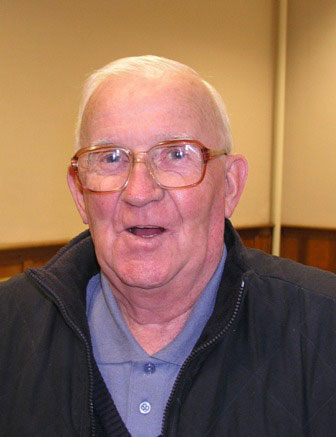
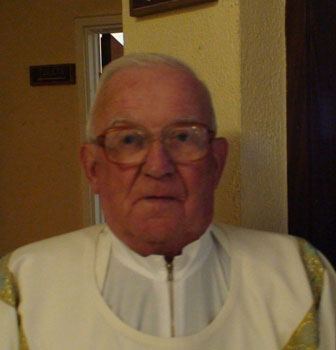

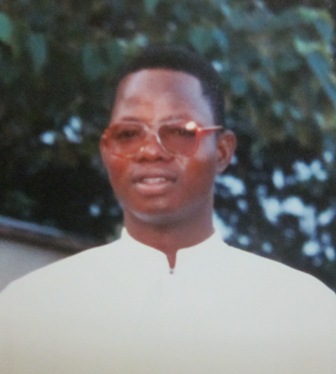
 The new Vicar Apostolic was born in Vuroro, Niger State and was ordained for the diocese of Ilorin in 1998. When Kontagora was erected as a Vicariate Apostolic he was incardinated in it, the first priest of the area.
The new Vicar Apostolic was born in Vuroro, Niger State and was ordained for the diocese of Ilorin in 1998. When Kontagora was erected as a Vicariate Apostolic he was incardinated in it, the first priest of the area.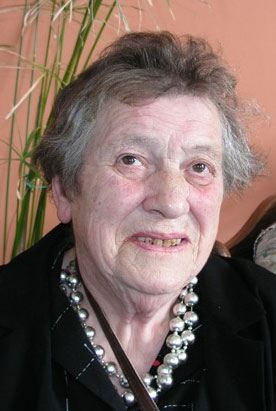

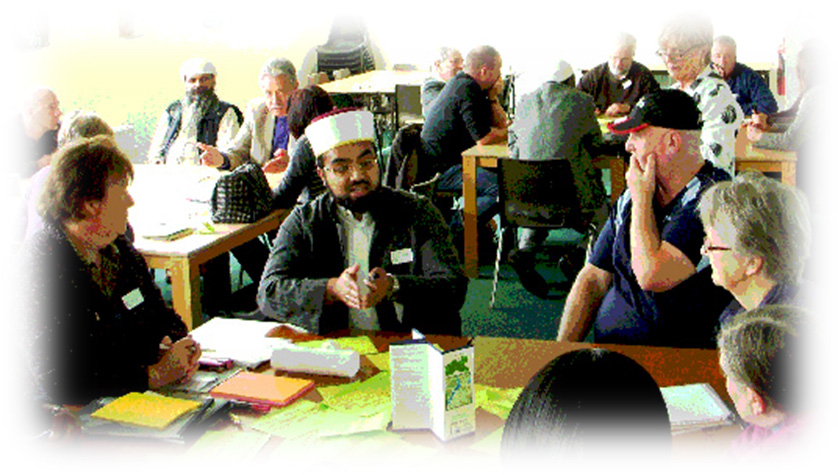

 During my years in Nigeria, an SMA colleague, who was an expert on African culture and art, visited me. He was also an expert on nature, especially being very knowledgeable about birds and animals. One day he asked me to go bird watching with him. At that time I had no interest in this but being free went along. We spent most of the day watching the various birds, especially looking at the incredible variety of sizes, shapes and colours. He was unbelieveably knowledgeable about them. The longer the day went on the more I became amazed and totally involved in what we were doing. In truth this other SMA priest revealed a world I knew nothing of up to then. He gave a whole new meaning to nature and opened up for me a whole new way of looking at it.
During my years in Nigeria, an SMA colleague, who was an expert on African culture and art, visited me. He was also an expert on nature, especially being very knowledgeable about birds and animals. One day he asked me to go bird watching with him. At that time I had no interest in this but being free went along. We spent most of the day watching the various birds, especially looking at the incredible variety of sizes, shapes and colours. He was unbelieveably knowledgeable about them. The longer the day went on the more I became amazed and totally involved in what we were doing. In truth this other SMA priest revealed a world I knew nothing of up to then. He gave a whole new meaning to nature and opened up for me a whole new way of looking at it.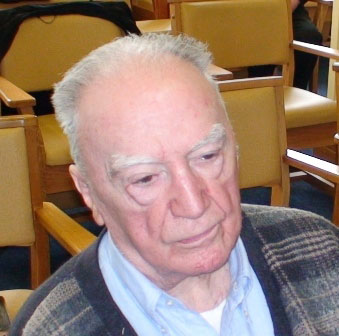
 Fr Sean MacCarthy SMA was buried after Requiem Mass at the St Joseph’s SMA Church, Wilton on Christmas Eve 2011. The Principal Celebrant and Homilist was the SMA Provincial Leader, Fr Fachtna O’Driscoll SMA.
Fr Sean MacCarthy SMA was buried after Requiem Mass at the St Joseph’s SMA Church, Wilton on Christmas Eve 2011. The Principal Celebrant and Homilist was the SMA Provincial Leader, Fr Fachtna O’Driscoll SMA.
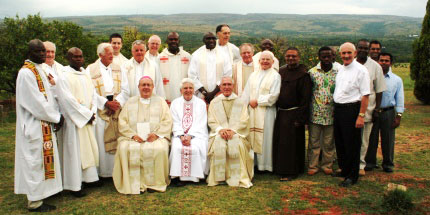


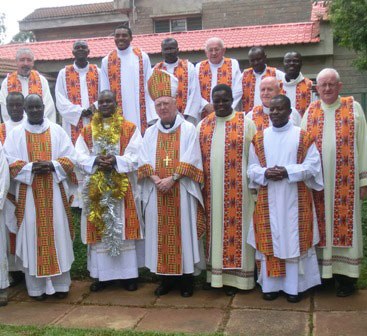
 While visiting the Formation House I had the privilege of receiving the Final Oath of permanent membership of the Society of Felix Namusonge and to be present as Bishop Patrick Harrington SMA ordained him to the diaconate. Felix has since left for pastoral work in Angola.
While visiting the Formation House I had the privilege of receiving the Final Oath of permanent membership of the Society of Felix Namusonge and to be present as Bishop Patrick Harrington SMA ordained him to the diaconate. Felix has since left for pastoral work in Angola.
You must be logged in to post a comment.